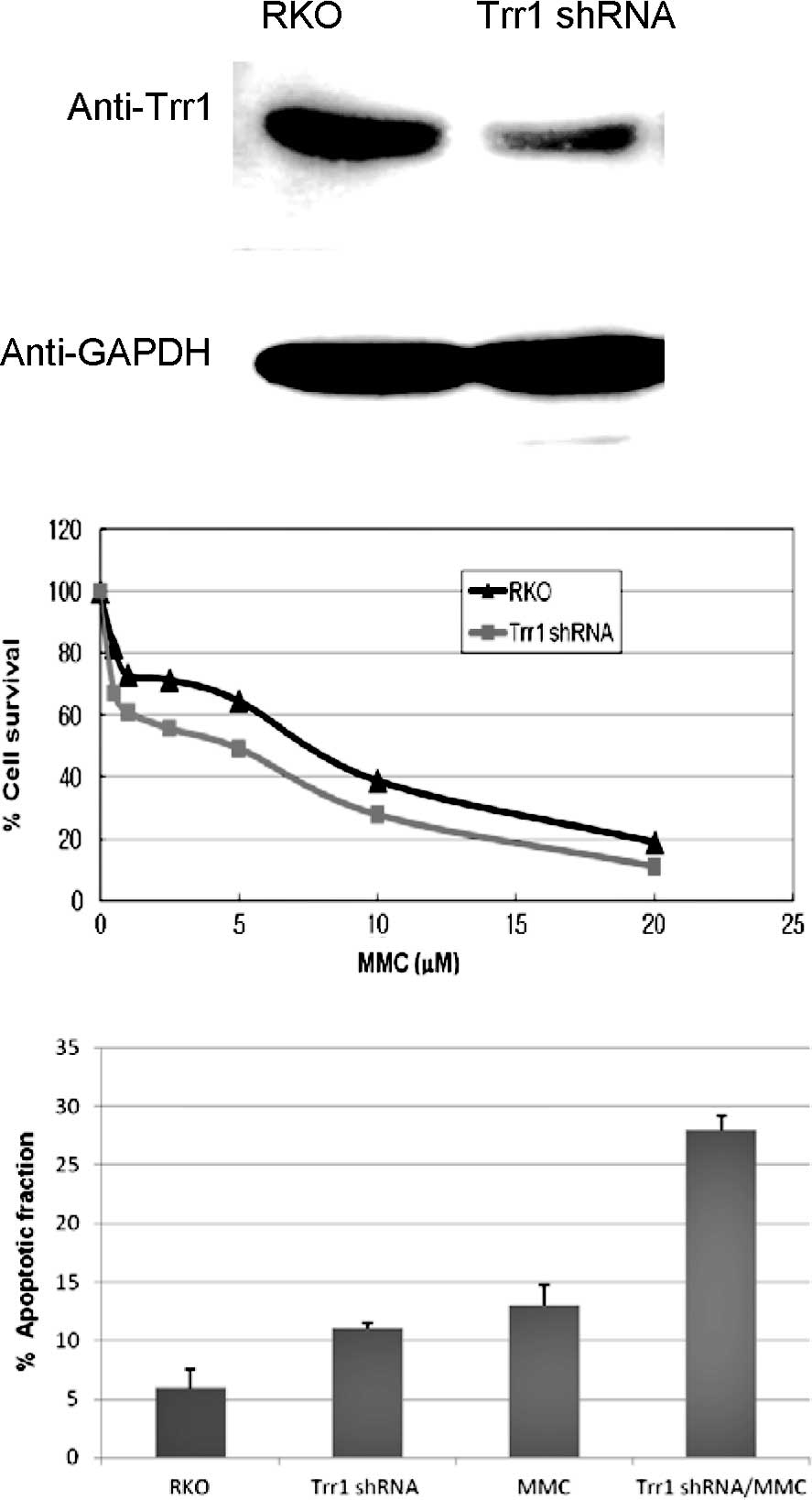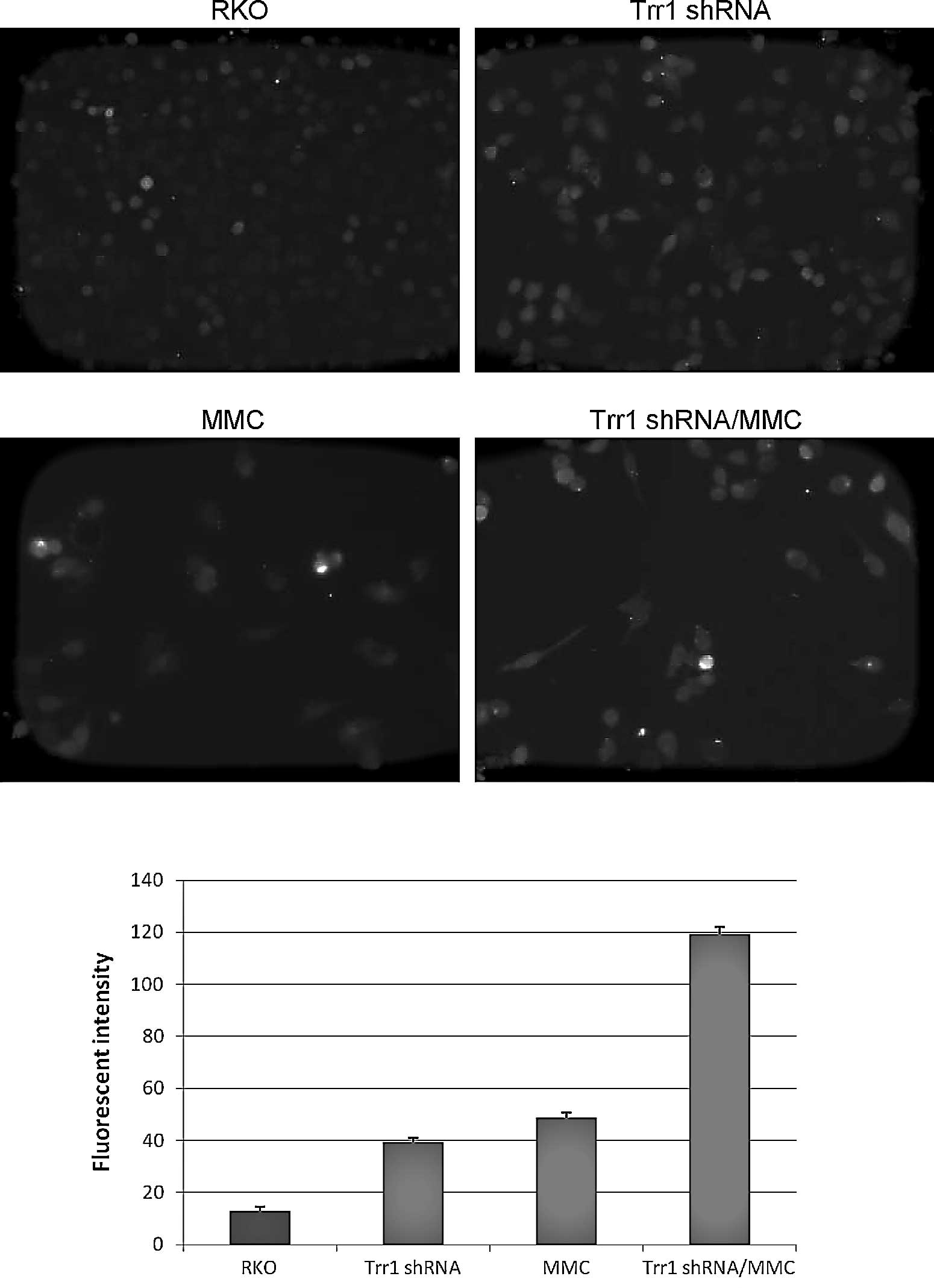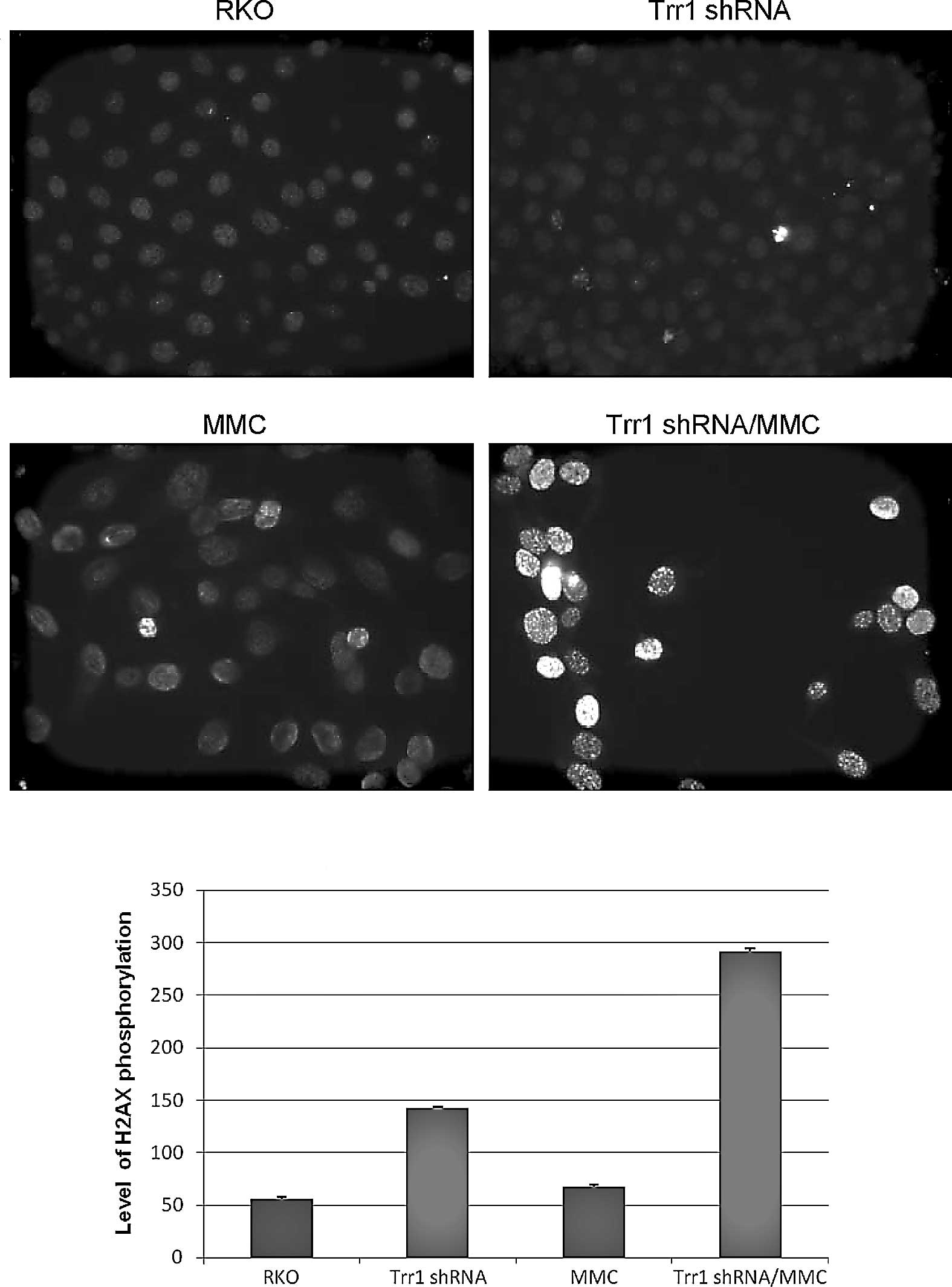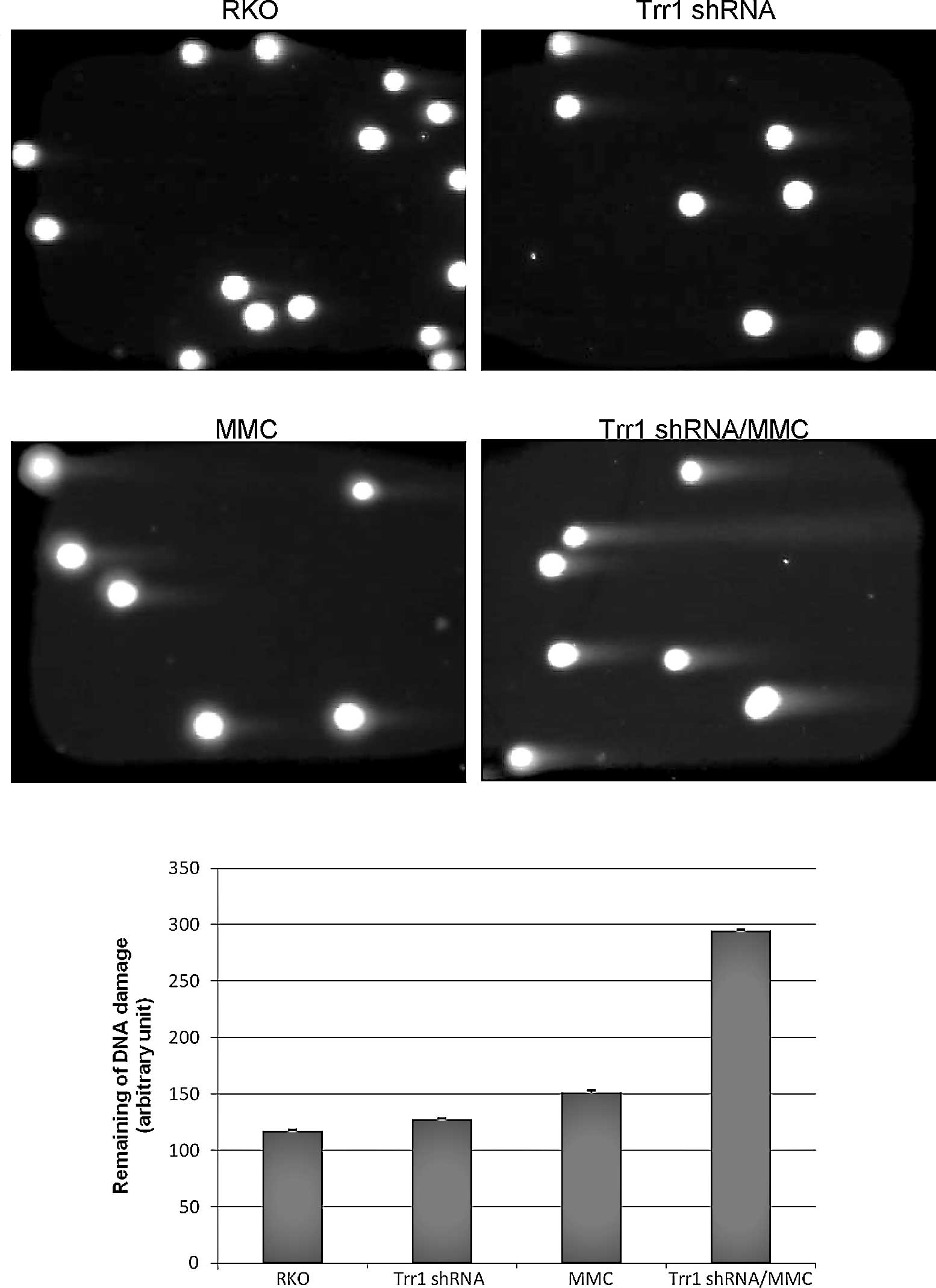|
1.
|
Sartorelli AC: The role of mitomycin
antibiotics in the chemotherapy of solid tumors. Biochem Pharmacol.
35:67–69. 1986. View Article : Google Scholar : PubMed/NCBI
|
|
2.
|
Crooke ST and Bradner WT: Mitomycin C: a
review. Cancer Treat Rev. 3:121–139. 1976. View Article : Google Scholar
|
|
3.
|
Sartorelli AC, Hodnick WF, Belcourt MF,
Tomasz M, Haffty B, Fischer JJ and Rockwell S: Mitomycin C: a
prototype bioreductive agent. Oncol Res. 6:501–508. 1994.PubMed/NCBI
|
|
4.
|
Tomasz M and Palom Y: The mitomycin
bioreductive antitumor agents: cross-linking and alkylation of DNA
as the molecular basis of their activity. Pharmacol Ther. 76:73–87.
1997. View Article : Google Scholar
|
|
5.
|
Verweij J and Stoter G: Severe side
effects of the cytotoxic drug mitomycin-C. Neth J Med. 30:43–50.
1987.PubMed/NCBI
|
|
6.
|
Kryukov GV, Castellano S, Novoselov SV,
Lobanov AV, Zehtab O, Guigo R and Gladyshev VN: Characterization of
mammalian selenoproteins. Science. 300:1439–1443. 2003. View Article : Google Scholar : PubMed/NCBI
|
|
7.
|
Arnér ES and Holmgren A: Physiological
functions of thioredoxin and thioredoxin reductase. Eur J Biochem.
267:6102–6109. 2000.
|
|
8.
|
Arnér ES and Holmgren A: The thioredoxin
system in cancer. Semin Cancer Biol. 16:420–426. 2006.
|
|
9.
|
Choi JH, Kim TN, Kim S, Baek SH, Kim JH,
Lee SR and Kim JR: Over-expression of mitochondrial thioredoxin
reductase and peroxiredoxin III in hepatocellular carcinomas.
Anticancer Res. 22:3331–3335. 2002.PubMed/NCBI
|
|
10.
|
Rundlöf AK and Arnér ES: Regulation of the
mammalian selenoprotein thioredoxin reductase 1 in relation to
cellular phenotype, growth, and signaling event. Antioxid Redox
Signal. 6:41–52. 2004.PubMed/NCBI
|
|
11.
|
Pan SS, Forrest GL, Akman SA and Hu LT:
NAD(P)H: quinone oxidoreductase expression and mitomycin C
resistance developed by human colon cancer HCT 116 cells. Cancer
Res. 55:330–335. 1995.PubMed/NCBI
|
|
12.
|
Perry RR, Greaves BR and Kang Y:
Development and initial characterization of a mitomycin C-resistant
colon cancer cell line variant. Cancer Chemother Pharmacol.
32:326–328. 1993. View Article : Google Scholar : PubMed/NCBI
|
|
13.
|
Willson JKV, Long BH, Marks ME, Brattain
DE, Wiley JE and Brattain MG: Mitomycin C resistance in a human
colon carcinoma cell line associated with cell surface protein
alterations. Cancer Res. 44:5880–5885. 1984.PubMed/NCBI
|
|
14.
|
Biaglow JE and Miller RA: The thioredoxin
reductase/thioredoxin system: novel redox targets for cancer
therapy. Cancer Biol Ther. 4:6–13. 2005. View Article : Google Scholar : PubMed/NCBI
|
|
15.
|
Fujino G, Noguchi T, Takeda K and Ichijo
H: Thioredoxin and protein kinases in redox signaling. Semin Cancer
Biol. 16:427–435. 2006. View Article : Google Scholar : PubMed/NCBI
|
|
16.
|
Yoo MH, Xu XM, Carlson BA, Patterson AD,
Gladyshev VN and Hatfield DL: Thioredoxin reductase 1 deficiency
reverses tumor phenotype and tumorigenicity of lung carcinoma
cells. J Biol Chem. 281:13005–13008. 2006. View Article : Google Scholar : PubMed/NCBI
|
|
17.
|
Yoo MH, Xu XM, Carlson BA, Patterson AD,
Gladyshev VN and Hatfield DL: Targeting thioredoxin reductase 1
reduction in cancer cells inhibits self-sufficient growth and DNA
replication. PLoS One. 2:e11122007. View Article : Google Scholar : PubMed/NCBI
|
|
18.
|
Hatfield DL, Yoo MH, Carlson BA and
Gladyshev VN: Selenoproteins that function in cancer prevention and
promotion. Biochim Biophys Acta. 1790:1541–1545. 2009. View Article : Google Scholar : PubMed/NCBI
|
|
19.
|
Taneja N, Davis M, Choy JS, Beckett MA,
Singh R, Kron SJ and Weichselbaum RR: Histone H2AX phosphorylation
as a predictor of radiosensitivity and target for radiotherapy. J
Biol Chem. 279:2273–2280. 2004. View Article : Google Scholar : PubMed/NCBI
|
|
20.
|
Fairbairn DW and O'Neill KL: The neutral
comet assay is sufficient to identify an apoptotic ‘window’ by
visual inspection. Apoptosis. 1:91–94. 1996.
|
|
21.
|
Wojewodzka M, Buraczewska I and Kruszewski
M: A modified neutral comet assay: elimination of lysis at high
temperature and validation of the assay with anti-single-stranded
DNA antibody. Mutat Res. 518:9–20. 2002. View Article : Google Scholar : PubMed/NCBI
|
|
22.
|
Bachur NR, Gordon SL and Gee MV: A general
mechanism for microsomal activation of quinone anticancer agents to
free radicals. Cancer Res. 38:1745–1750. 1978.PubMed/NCBI
|
|
23.
|
Handa K and Sato S: Generation of free
radicals of quinone group-containing anti-cancer chemicals in
NADPH-microsome system as evidenced by initiation of sulfite
oxidation. Gann. 66:43–47. 1975.
|
|
24.
|
Brendel M and Ruhland A: Relationships
between functionality and genetic toxicology of selected
DNA-damaging agents. Mutat Res. 133:51–85. 1984. View Article : Google Scholar : PubMed/NCBI
|
|
25.
|
Lawley PD and Phillips DH: DNA adducts
from chemotherapeutic agents. Mutat Res. 355:13–40. 1996.
View Article : Google Scholar : PubMed/NCBI
|
|
26.
|
Adikesavan AK and Jaiswal AK:
Thioredoxin-like domains requied for glucose regulatory protein
58-mediated reductive activation of mitomycin C leading to DNA
cross-linking. Mol Cancer Ther. 6:2719–2727. 2007. View Article : Google Scholar : PubMed/NCBI
|
|
27.
|
Kennedy KA, McGurl JD, Leondaridis L and
Alabaster O: pH dependence of mitomycin C-induced cross-linking
activity in EMT6 tumor cells. Cancer Res. 45:3541–3547.
1985.PubMed/NCBI
|
|
28.
|
Berggren M, Gallegos A, Gasdaska JR,
Gasdaska PY, Warneke J and Powis G: Thioredoxin and thioredoxin
reductase gene expression in human tumors and cell lines, and the
effects of serum stimulation and hypoxia. Anticancer Res.
16:3459–3466. 1996.PubMed/NCBI
|
|
29.
|
Eriksson SE, Prast-Nielsen S, Flaberg E,
Szekely L and Arnér ES: High levels of thioredoxin reductase 1
modulate drug-specific cytotoxic efficacy. Free Radic Biol Med.
47:1661–1671. 2009. View Article : Google Scholar : PubMed/NCBI
|
|
30.
|
Jeggo PA and Löbrich M: DNA double-strand
breaks: their cellular and clinical impact? Oncogene. 26:7717–7719.
2007. View Article : Google Scholar : PubMed/NCBI
|


















